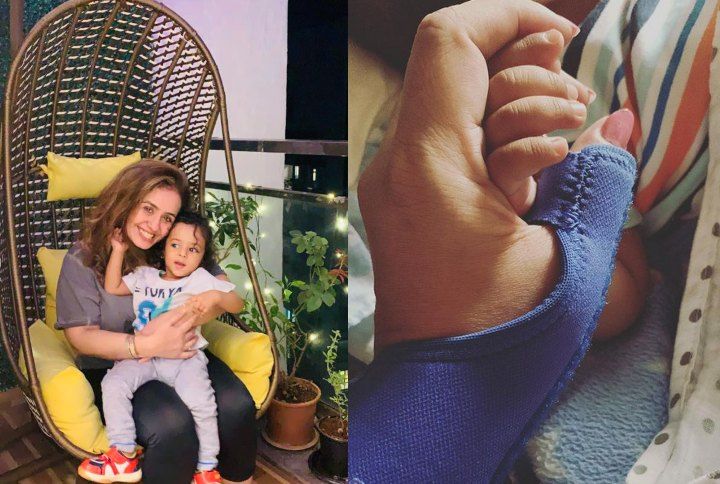Vandana Sajnani Khattar, Actor, Producer, Director and Theatre Personality has had a tough, painstaking and challenging motherhood. Getting pregnant at 44, after numerous miscarriages, IUI and IVF failures, and failed surrogacies was far from easy, physically and mentally. Her tumultuous pregnancy resulted in both prepartum and postpartum depression. We rarely discuss or even acknowledge these conditions in our society, but they are real, and far more common than we think. Vandana’s story is hard to read, but we hope it encourages more people to speak up about it and give it the attention and acceptance it deserves.
Vandana says,
I felt I was going down under. As if I was alone in this fight. I wanted to sit alone in darkness and talk to no one. I was in a shell. Something did not feel right, but I couldn’t particularly say what.
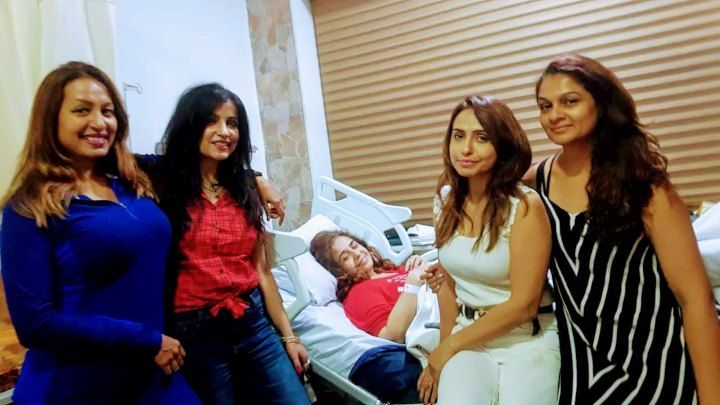
Her Experience With Prepartum Depression
While getting pregnant was “a miracle” for Vandana, it was one with many medical issues. She was carrying twins and two months into her pregnancy, she was informed that her uterine lining was weak. It had to be fixed and she was prescribed bed rest, with her legs raised for three months.
I was bedridden and couldn’t even put my legs down to go to the bathroom. I was using a bedpan for three months. Those months were the most painful, emotionally draining, and fearful time of my life.
However, one day she suddenly started bleeding, and a poorly-thought-out medical decision forced her into an emergency C-section. Unfortunately, she lost one of her babies and her son, Yuvaan, was born prematurely. At 700 grams, he was rushed into the NICU. Vandana said that Surya Hospital‘s well-equipped NICU kept her baby healthy for 3 months. Her painful pregnancy, loss of her baby and traumatic delivery hit Vandana hard and sunk her into prepartum depression. She says,
I can’t even tell you what a sight it was to see my baby so tiny and the size of an arm, with wires all over his face, surrounded by pipes and tubes. The entire experience was full of stress, pain, anxiety, fear and sadness. Later, my doctor told me that it was prepartum depression, and because I did not attend to it with the right medication or counselling, it soon aggravated to postpartum depression.
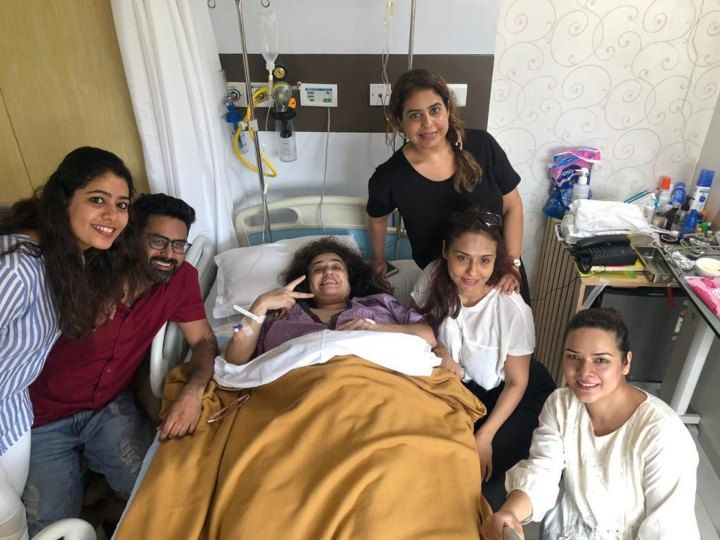
Her Experience With Postpartum Depression
After Yuvaan’s birth, Vandana wasn’t feeling well. Her family encouraged her to seek help as she was feeling “hollow on the inside”, and they wanted her to overcome her feelings of detachment. However, another storm hit her and brought on her postpartum depression. She and her husband, Rajesh Khattar, took her son for a check-up and were wrongly informed that he would have difficulty in seeing and hearing, and were asked to undergo multiple tests.
Rajesh and I were completely shocked. He asked us to do a dozen tests on my baby, including extensive audio tests, vision tests, MRI’s, nerve tests and what not! My baby had just undergone two hernia operations upon delivery. Imagine making him go through these tests again! Even though another doctor told me that my baby was fine, I still was doubtful and went ahead and regularly did those tests, which had normal results. This trauma made me insane. My family knew the depression had hit me badly before. I wasn’t ready to understand that I needed help and medical assistance to keep my equilibrium. My baby was growing beautifully, but I was deteriorating.
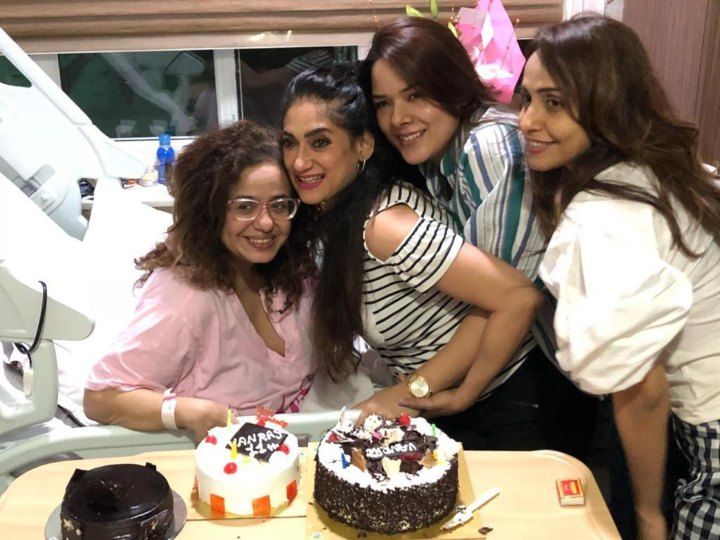
The Breaking Point
Vandana’s breaking point was when she completely broke down due to her postpartum depression. She was crying irrevocably and it got so intense that she collapsed and blacked out. She had to be rushed to the hospital (which was even harder during the lockdown) and was admitted for nearly two months, which she still has no memory of. Fortunately, Vandana’s family was by her side throughout. Her sisters, mother-in-law and husband were “extremely considerate, loving and supportive of her condition”. They took care of her baby and didn’t leave her alone even once.
It was the toughest time for my entire family especially Rajesh. He had no domestic help due to lockdown, had to handle a small baby, his unwell mother and his wife who was in the hospital! It was extremely difficult, but he pulled through and was my rock.
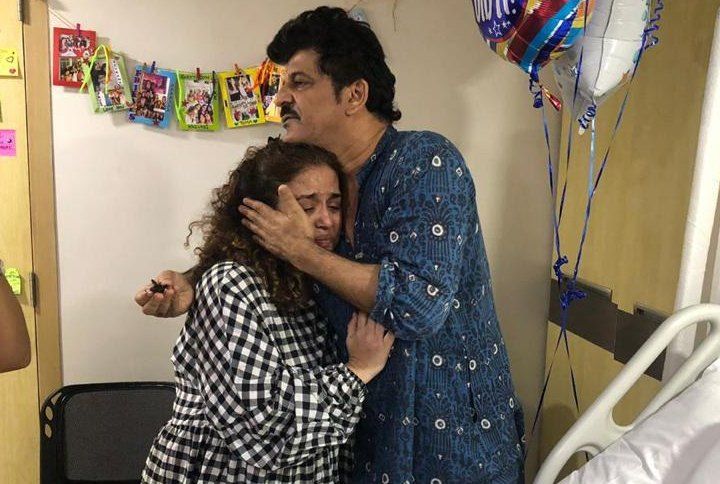
The Road To Recovery
When Vandana spoke to her doctors, they told her that for someone who has been through such a difficult journey, she was bound to suffer from prepartum and postpartum depression. Had she known and sought medical help earlier, it would have helped her a lot and not become so severe.
I started feeling grateful for my life. My dream of becoming a mother had come true with a miracle baby who was a fighter, just like his mom. But it still took me months to get back to my normal life and routine. For days, I would be lying in bed with my baby beside me, trying to comprehend what exactly happened. But nothing would come to my mind. It was all blank. It took me a while to bond with my baby as well, which is common for mothers recovering from postpartum depression. Now, after all my medication and meditation, I’m all good, back in action, in control of myself, my home, my baby and loving every minute of motherhood!
Vandana’s Advice
To someone dealing with prepartum and postpartum depression, she says,
Please do not neglect any such signs and feelings and do visit an expert for immediate help. These are extremely real and painful conditions, and if left unattended negatively, can affect your life.
She also urges people to not be ashamed or stigmatised to seek help and talk about this! Had she gotten help earlier, she may not have had a total breakdown and could have avoided spending two months in the hospital.
To their family and friends, she says,
It can be very overwhelming, exhausting and at times very frustrating, but one must be patient when someone you love is suffering from this. Show them love and support and most importantly never leave them alone.
Prepartum and postpartum depression are extremely normal, important and need to be recognised as “real” illnesses. Societal stigmas and taboos need to be eliminated and more people need to feel empowered and supported enough to speak up about it.
Have you ever experienced something like this? Please share your story with us in the comments below.
Join Malini’s Girl Tribe to be a part of the conversation.

